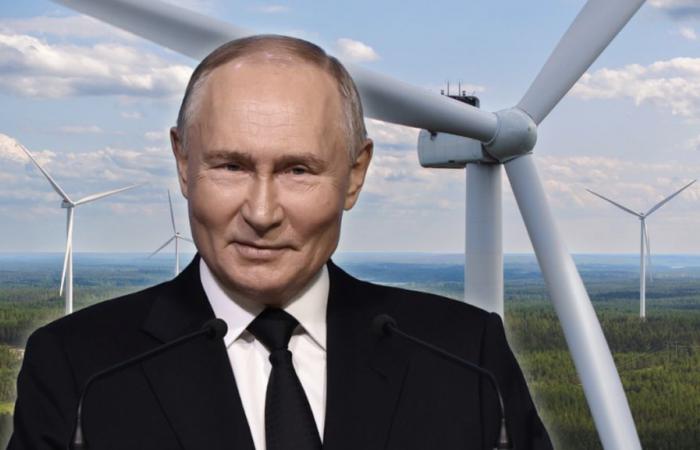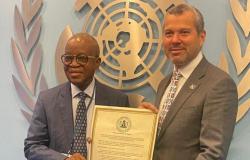Vladimir Putin has influence on sustainable electricity production in Sweden.Image: watson/getty/keystone
Vladimir Putin is not only systematically destroying Ukraine’s energy supply, he is now also exerting a disruptive influence on sustainable electricity production in Sweden.
21.11.2024, 06:0221.11.2024, 07:58
Niels Anner, Copenhagen / ch media
More from “International”
While in Baku, at the climate summit, we are desperately looking for solutions against global warming, the Swedish government has abruptly put the brakes on the expansion of green wind energy. It decided to suspend 13 of the 14 large wind projects planned in the Baltic Sea. The reason is security concerns: the Swedish military has noted that offshore wind installations could disrupt radar surveillance and underwater sensors.
This would jeopardize the security of the Baltic Seaexplained Defense Minister Pal Jonson, because missiles and submarines would be more difficult to detect, and defense systems like Patriot anti-aircraft missiles could be less effective.
Wind projects, particularly in the eastern part of the Baltic Sea, could therefore have “unacceptable consequences” for the defense of the countryespecially given the Kremlin’s aggressive policies and the fact that the heavily militarized Russian enclave of Kaliningrad is only 300 kilometers from the Swedish coast.
The military said wind farms could hamper radar surveillance to the point that a cruise missile launched toward Sweden could be detected a minute later than usual. The problem of interference from wind turbines affects large areas of the Baltic Sea, making it impossible to simply move these parks elsewhere.
The right-wing government’s decision not only calls into question Sweden’s climate commitment, but also its energy security: the planned installations could have produced more than 140 terawatt hours of green electricity, as much as Sweden’s annual consumption and the equivalent of the production of around 20 nuclear reactors.
Of big doubts on the implementation
There are therefore many criticismsfrom environmental organizations, industry, but also military experts. The categorical decision raises questions about how Sweden will achieve energy change and remain competitive, the wind industry association said. Furthermore, billions of investments already made would be lost. Several critics have pointed out that in other northern countries that rely heavily on wind energy, the army sees no problem.
There are solutionssaid Anders Odell, an expert at the Swedish Defense Research Institute. The United Kingdom, Denmark and Poland have solved the problems by moving wind farms further from the coast or by installing sensors directly on the turbines. In Denmark and Norway, for example, offshore wind farms are a priority because they do not affect the landscape.
Former Defense Minister Mikael Odenberg also said the military difficulties could be resolved. According to him:
“The current decision is catastrophic in terms of economic and energy policy”
Other critics have pointed out the paradox that it was precisely Russia’s attack on Ukraine that triggered the energy crisis and that there is an urgent need to develop wind energy – something neighboring countries around the Baltic Sea have understood.
Rejection of criticism
The army rejects criticism: in the planned projects it is impossible to find technical solutions to improve radar systems. On the contrary, said Mikael Oscarsson, head of security policy for the ruling Christian Democratic Party, wind turbines could thus become a military target.
Conservative Prime Minister Ulf Kristersson said, slightly annoyed, that he was “surprised, even shocked by the reactions”: According to him, security aspects in the Baltic Sea must be given absolute priority in the current situation with Russia.
His government is working in parallel on the expansion of nuclear energy: over the next 20 years, ten large new Swedish reactors are planned to be commissioned to ensure the energy transition with electricity from nuclear sources.
Translated and adapted by Noëline Flippe
International news day and night, it’s here
Show all articles
After almost three years of war, 1000 days to be exact, the situation remains inextricable. A clear military victory is not in sight, and neither side has a clear advantage. Ukraine, however, is on the defensive at all levels.
This Tuesday marks exactly 1000 days since Vladimir Putin gave the order to invade Ukraine. The third winter of war will soon begin. This threatens to be “particularly cold and dark”, estimates the Austrian daily Standard. Russian airstrikes have hit the country’s energy infrastructure hard, most recently over the weekend.






